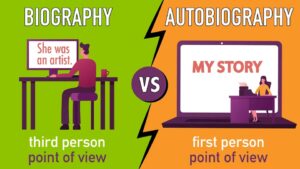
Introduction
Have you ever wondered about the differences between a memoir and a biography? Though both tell compelling stories about individuals’ lives, they do so in distinct ways. Understanding these differences can help you appreciate each genre’s unique approach to storytelling. In this article, we’ll explore which statements best reflect the difference between a memoir and a biography? Select two options that encapsulate these differences, and learn more about the fascinating nuances of these literary forms.
What is a Memoir?
A memoir is a literary genre where the author writes about personal experiences and reflections. It focuses on specific moments or themes in the author’s life, offering an intimate glimpse into their world. Memoirs are often written in the first person, providing a deeply personal and subjective account of events Biography.
What is a Biography?
A biography, on the other hand, is an account of a person’s life written by someone else. It aims to provide a comprehensive and factual representation of the subject’s life, from birth to death (or the present day). Biographies are typically written in the third person and rely on extensive research, including interviews, letters, and other sources of information.
Key Differences Between Memoirs and Biographies
Personal Perspective vs. Factual Account
Memoirs are deeply personal and subjective. They offer the author’s perspective on their own experiences, emotions, and thoughts. In contrast, biographies aim to provide a factual and objective account of someone else’s life, focusing on verifiable information and historical accuracy Biography.
Subjectivity vs. Objectivity
Memoirs are inherently subjective, as they are based on the author’s personal memories and feelings. The author’s interpretations and emotions color the narrative. Biographies strive for objectivity, presenting the subject’s life based on evidence and research, with minimal personal bias from the author.
Narrative Style and Voice
Memoirs often have a conversational and reflective tone, as if the author is confiding in the reader. They may include literary devices like metaphors and analogies to convey emotions and themes. Biographies tend to have a more formal and detached tone, focusing on presenting information clearly and accurately Biography.
Chronology and Scope
Memoirs do not necessarily follow a strict chronological order. They may jump between different periods of the author’s life to highlight specific themes or events. Biographies, however, usually follow a chronological timeline, providing a structured and comprehensive overview of the subject’s life Biography.
Author’s Intent and Audience
The primary intent of a memoir is often to share personal stories, insights, and lessons learned. Memoirs can inspire, entertain, and provide emotional connection. Biographies aim to inform and educate readers about the subject’s life and achievements, often highlighting their impact on society or history Biography.
Emotional Engagement
Memoirs engage readers on an emotional level, inviting them to connect with the author’s experiences and emotions. They often evoke empathy and reflection. Biographies, while also engaging, focus more on intellectual engagement, encouraging readers to understand the subject’s life and contributions Biography.
Which Statements Best Reflect the Difference?
To encapsulate the essence of memoirs and biographies, we can select two key statements:
- Memoirs are subjective and written from the author’s personal perspective, while biographies are objective accounts based on thorough research.
- Memoirs focus on specific themes or periods in the author’s life, whereas biographies provide a comprehensive and chronological account of the subject’s entire life.
These statements highlight the core differences in perspective, scope, and intent between the two genres Biography.
Conclusion
Understanding the differences between memoirs and biographies enriches our appreciation of both genres. Memoirs offer a personal, introspective look at an author’s life, filled with emotions and reflections. Biographies provide a detailed, factual account of someone else’s life, offering insights into their contributions and significance. By recognizing these distinctions, readers can better choose the type of narrative they wish to explore Biography.
Frequently Asked Questions (FAQs)
1. Can a memoir be considered a type of autobiography?
Yes, a memoir is a type of autobiography, but it focuses on specific themes or periods of the author’s life rather than providing a comprehensive account.
2. Are biographies always accurate?
While biographies strive for accuracy through research and evidence, they can still contain biases based on the author’s interpretations and the available sources.
3. Can a memoir include fictional elements?
Memoirs should be based on true events and personal experiences, but they may include creative storytelling techniques to convey emotions and themes effectively Biography.
4. Do biographies require permission from the subject or their family?
It depends. Some biographies are authorized and involve cooperation with the subject or their family, while unauthorized biographies are written without such permission.
5. Which is more popular, memoirs or biographies?
Both genres are popular, but memoirs often attract readers looking for personal and emotional narratives, while biographies appeal to those interested in historical and factual accounts.
Understanding the nuances between memoirs and biographies can deepen our appreciation for the stories they tell and the ways in which they connect us to the lives of others.

